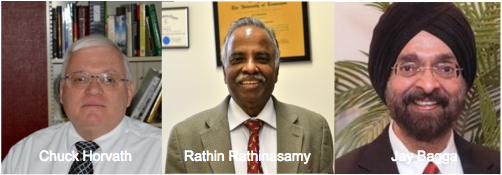International students in STEM fields have the opportunity to work in the United States for a predetermined amount of time after they graduate . The length depends on the type of field the student pursues. These opportunities provide valuable experiences for students to immerse themselves in the American culture and also to apply the skills they’ve learned in a way that may be different than they would in their home country. There is some opposition toward these programs and also to the possibility of extending the length of Optional Practical Training (OPT) in particular, which organizations such as the Washington Technical Alliance are fighting for.
OPT is a program for international students who have gone to school in America. Students in this program must have been pursuing their degree for at least nine months or have just finished their degree to qualify.
Ball Bearings sat down with four people to discuss the topic: Chuck Horvath, an instructor of business who has experience teaching internationally; Rathin Rathinasamy, a professor of finance who is currently teaching classes regarding international finance; Jay Bagga, a professor in the department of computer science and is also the director of the South Asia Exchange Program; and Farhin Antara, an international graduate student from Bangladesh studying statistics in the mathematical sciences department. She came here because she wanted to get higher training from a North American university.
Ball Bearings: In your opinion, should international students be able to work in the US? Do your opinions change based on whether or not the employment is during or after the completion of the degree?
Chuck Horvath: I don’t see any problem in their working while they’re students, given that they’ve come on a student visa. What happens after they’ve ceased being students needs to be renegotiated with the government.
Rathsin Rathinasamy: I think the international students do have quite a few employment opportunities. For example, they can work on campus when they’re studying, as long as they’re full time students and meet certain requirements and so forth. I think what is important is that they get ready for studies, so it is important that they devote their time. The main problem is if they take too many courses and then work too many hours, it will be difficult to balance them both. So I think there is enough and more opportunities for them for every day. Plus after they complete they can go on OPT and they can then go on to work permanently if their employers sponsor them. The difficult part is sponsoring them.
Jay Bagga: Well, there are two parts to this. Of course, during their employment, during their degree, their visa is a student visa, so that permits them to work on campus, not outside. And the idea is for them to be able to get some training when they are also being educated and this training should be related to their education. All of this helps them in terms of getting some training in the way jobs are done here. That prepares them for after graduation when they go out into the real world and look for jobs. Now, after they have graduated from Ball State, they have to follow a process. Normally they are given what’s called an optional practical training, an OPT, kind of a visa which lets them find jobs in their field for a limited amount of time, usually one to two years, maybe 18 months. That also helps them in getting trained in their profession. Those are the jobs that many students legally can do, the US visa allows them to do that.
Farhin Antara: It’s quite tough to manage the whole tuition by their own. During their education, if they are about to get any job, it’s helpful for the students because students don’t need to be getting stressed during their study period. Also after their graduation it would be helpful for students if they get any type of job because it will help them to get more their subject-related job in the future if they have the experience.
BB: Why do you think there may be opposition toward employment in the US for international students?
CH: I think it’s part of the broader picture of the tight economic climate here, certainly the loss of middle class jobs, to the extent that there’s a perception that the better jobs, the better paying jobs are scarce. Then the question of who has first claim on them would be part of the debate for that.
RR: We are a land of immigrants. This is a country built by great minds and our country is great because of the open immigration policy. I think, given the high unemployment rate, and the hardships faced by the average American, they already are suspicious of the foreigners. They don’t realize they’re bringing the talents and much-needed brainpower to help this country grow and move forward. I think when people get educated and realize that the foreign students bring in a lot of talent and brainpower, people will probably change their mind, and it’s difficult to say.
JB: I don’t know if there is opposition in terms of international students taking away jobs from students here. But if the students are to be following the rules and are able to be trained in their profession, I don’t see why there should be opposition. Especially if the students are not displacing or taking away jobs from the current and local citizens.
FA: I think it’s kind of to demotivate students not to only seek further job. They should concentrate more on studies, so it’s to demotivate them.
BB: How might language limitations impact student’s ability to work and what kind of jobs they take on?
CH: That depends on individual case by case basis. Most of my experience with foreign students in the United States is that their English is very good.
RR: I think the language, especially the English language, could be a problem for foreigners. But most foreigners come here and get trained and do very well in English, and they learn the culture and you know, meet with people and so forth. So in my opinion, it should not be a problem. Plus they can always get trained and move on and they don’t need to be in the fields where they constantly come into contact with people, like restaurant service help or something, but they may be able to do high-end jobs like engineering, computer science, and other fields.
JB: Students who come to Ball State for example, have to go through an English language examination, and they have to do English proficiency tests, so in fact that’s a requirement for admission into a university like Ball State. What happens then is that they get even more accustomed to the language and accents and the way things are done here by working in their jobs and being students. Now, in the fields such as computer science and sciences, students can excel at jobs where it is their profession to do programming or software development because it is the technical skills that they do have and they do not communicate directly with many customers or many clients. But in jobs where there is a lot of communication with others, clients or whoever they are serving, then students in those jobs sometimes need better training for communication purposes.
FA: In some instances, if you’re an international student and you don’t have much knowledge about the language, you can communicate, but you can’t communicate that confidently.
BB: Should the course of study affect how long/if an international student gets to work here?
RR: I think so. The reason they have that setup is that those people bring in more skill sets to the job market and they will be matching up what is needed in the job market and what they bring in. So the longer they work, the more training they get, and it will also benefit the country as well. So I think it works both ways: it will benefit both the country and the people, so I think they should work longer and be educated here for longer, like a graduate degree for example.
JB: Beyond that optional length of time (OPT) they have to go through a lot of paperwork and other kinds of requirements if they want to apply for a more long term job. There are those situations, but they have to go through those processes and if they obtain those permissions, then they can obtain those longer-term jobs. So the length requirements depend on the job and the kind of visa they are on.
BB: What do you think the benefits are of an international student applying skills learned in their program here are vs forcing them to go back to their home country immediately? (Both personally as a student, and generally as an expert)
CH: It’s a trade-off. If it’s an under-served specialty, take the extreme, a doctor. If it helps us fill a need that isn’t being filled elsewhere that’s great. The other side of it though is, to what extent do foreign students originally come here so that they can learn something to better serve their own people, but then they like it here, so they don’t go back to serve their own people and their own societies end up suffering by their absence?
RR: The job market here is quite different. There are a lot more opportunities to learn new skillsets here, so in that sense, if they work here and get trained in an American setting around Americans, I think they can learn more skills and then apply them when they go back home. It doesn’t have to be either/or; they can work here and then go back, and then come back, and so forth.
JB: I think it depends on their personal situation. Many students who do come for education here, once they are graduated and do the OPT they do go back because they have come to the US on a limited engagement. Some of these students are sent by their employers or by their government employees if they are working in their city or state or federal government. They then they do go back and they contribute to their own country. Other students who have come on their own have to decide based on their personal situation whether or not they want to stay or go back.
FA: After they are graduating from here, if they get any kind of job or some training or something from here, it will be helpful for them because it’s experience that they can gather from here and then they can utilize it when they are back home. It’s obvious in any country they will always prefer higher and more experience in their employee. So if they get any kind of experience or job training opportunity here, it’s better.
BB: Do you see the OPT as a good opportunity for these students?
RR: A very good thing, very good thing. It’s very well-structured. The setup is good with the twelve months for undergraduates and additional time for students with degrees like actuarial science, math engineering, STEM degrees and so forth. I think that seems to be very well thought-out and very well planned and I am happy they have done that. What many students may not know is that they can work in international organizations. I would think that would benefit both parties involved and they can go back to their home and take the skill-set and use them in the development of their country, especially if they work for a world bank and those kinds of international organizations.
JB: I think it is good because they get some practical experience from being employed in an environment where they were also educated and that experience that they gain helps them in their future employment, whether that’s in their home country or here. And since they get their degree from an American university or Ball State, having some experience in an American employment or job employment I think is very positive for them.
FA: Yeah, of course. During the studies we come to know about the theoretical stuff, about when we will go into the real life, practical life, so if we can link up whatever we studied and whatever we are going to do in practical, it would be very helpful. So this kind of training should be offered to everyone.
BB: What’re your thoughts on the length of OPT and the possibility of extending it?
CH: To the extent that an extension, like a practicum, is an extension of their education visa, no problem. To the extent that it becomes a shortcut to get around a proper residential visa, yeah, it’s a bypass.
RR: I think it is a good thing. I think they should not let it expire. I understand why, with the governmental pressure and so forth, they may let it expire, but I do not think that would be a good idea. We do need them, which means it is really a good idea to really extend that OPT as much as possible.
JB: I think the current amount of time that is permitted by the laws are adequate. I don’t know all the details but I think in some cases an extension can be asked for and that extension granted, but the additional time is quite adequate for the student to decide whether they want to stay or whether they want to go back. So I think it is working well, and most students that I talk to are excited about this OPT, and they look forward to being able to work.
FA: It depends; I mean how easy do you get them? During your training if you’re capable of observing everything during your time, then that is enough. But if you think, ‘oh, I am not satisfied, I need more time,’ it varies man to man. It’s an individual thing.





